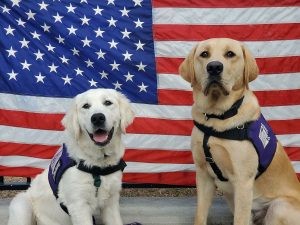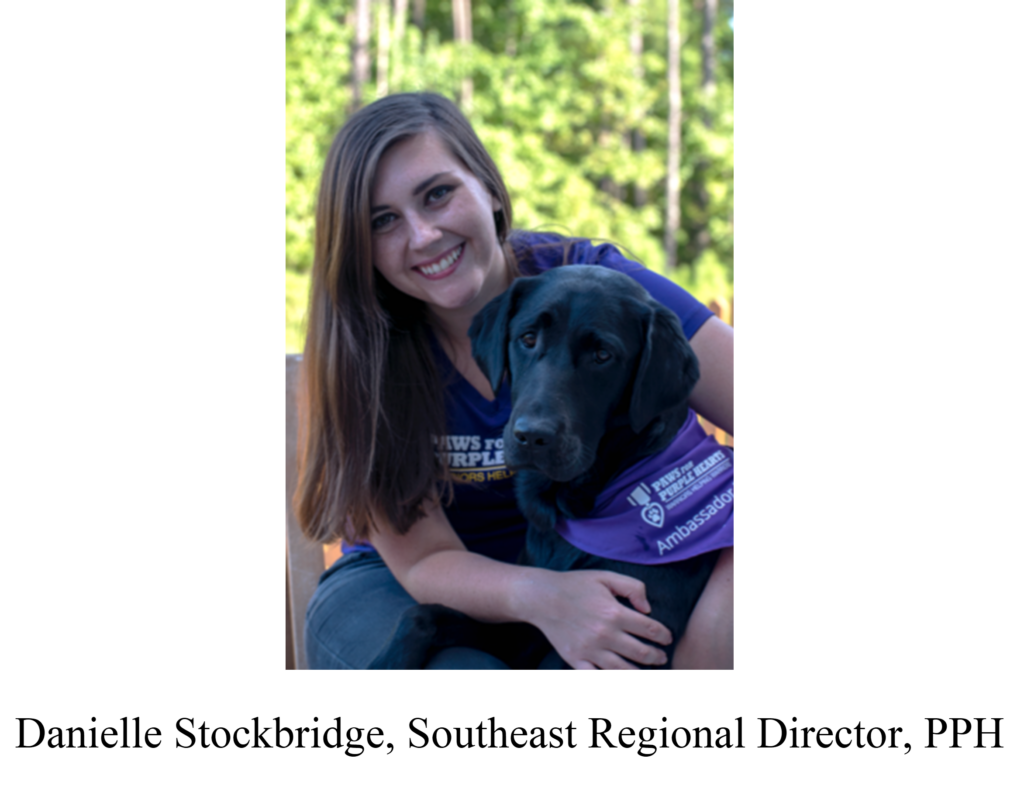
The Coalition for Government Procurement is thrilled to support Paws for Purple Hearts (PPH) through the Joseph P. Caggiano Memorial Golf Tournament on August 21. PPH assists and improves the lives of veterans and wounded service members by pairing service dogs with those in need. These canines help veterans with both mobility challenges and trauma-related conditions, supporting each veteran according to their needs. Last year, the Coalition was fortunate to raise $13,000 for PPH through the generosity of our members and participants of the tournament.
This year’s Joseph P. Caggiano Memorial Tournament will take place on August 21 at the Whiskey Creek Golf Club in Ijamsville, Maryland. To learn more about the event and register, click here.

Recently, we had the opportunity to interview Danielle Stockbridge, the Southeast Regional Director of PPH, to learn more about the organization’s background, goals, challenges, and impacts on the lives of veterans.
Below is a glimpse of just some of the topics we explored with Danielle. To view the full interview, click here.
1. Could you provide some background on how Paws for Purple Hearts got started? What was the driving force behind its establishment?
In 1975, Paws for Purple Hearts’ founder, Dr. Bonita Bergin, coined the concept and term “Service Dog.” Dr. Bergin realized that in addition to serving individuals with visual impairments, dogs could be trained to assist with mobility and psychiatric conditions as well.
In 1991, Dr. Bergin went on to spearhead the founding of The Bergin College of Canine Studies; the only school dedicated to educating dog trainers. Bergin College held a program at El Camino Continuation High School in which students assisted in the training of dogs to serve people with disabilities. This program was expanded to include the local juvenile detention center in order to give at risk teens purpose and greater self-esteem.
Dr. Bergin says one of her staff came back from the juvenile detention center program and said when he was watching a newscast about the struggles of Veterans in reintegrating into society, he realized this sort of Canine-Assisted recreational therapy program was a perfect fit for our Warriors. In 2006 this program became the beginning of the Paws for Purple Hearts’ Canine-Assisted Warrior Therapy®. In July 2008, Paws for Purple Hearts held the first Canine-Assisted Warrior Therapy® session at the Palo Alto VA’s Men’s Trauma Recovery Program in Menlo Park, California, with one hundred and thirty participants. Patients immediately responded to learning how to train dogs as a form of therapy for themselves and reported feeling a greater sense of purpose knowing that they have a new mission of helping a comrade-in-arms by helping to train a Service Dog.
In 2013, Paws for Purple Hearts launched its first Training Boot Camp, where Service Dogs who participated in Canine-Assisted Warrior Therapy® were matched with an impaired Warrior. During Boot Camp, now called Team Training, Warriors take a comprehensive, two-week training course on proper handling and commands of their new “Battle Buddy” Service Dog, who will help the Veteran reintegrate into society successfully. In 2015, Paws for Purple Hearts expanded, opening new facilities in Ruther Glen, Virginia, and Fairbanks, Alaska. In 2016, Paws for Purple Hearts opened facilities in San Antonio, Texas, and San Diego, California. In 2019, the Fairbanks operation moved to Anchorage, AK, making our services accessible to more Warriors.
2. What are the main programs or initiatives that Paws for Purple Hearts offers?
Social Therapy:
Social Therapy uses the unique skills of our Service Dog in Training to bring comfort and joy to Warriors in a hospital or group setting. Social Therapy uses our dogs’ innate empathy, calm demeanor, and approachability to assist in the recovery process of injured Warriors.
Canine-Assisted Warrior Therapy®:
Our signature program is Canine-Assisted Warrior Therapy®. This innovative therapeutic Service Dog training program teaches Veterans and Active-Duty Military Personnel with Post-traumatic Stress Disorder and Traumatic Brain Injury the skill of training Service Dogs for Veterans with combat-related injuries.
Assistance Dog Placement:
Paws for Purple Hearts pairs meticulously bred, lovingly raised, and thoroughly trained Assistance Dogs with their ideal Warrior recipients using a scientifically rigorous matching methodology developed by the Bergin College of Canine Studies.
3. Can you describe the impact the programs/initiatives have on Veterans?
During Canine-Assisted Warrior Therapy®, Warriors work with the same dog weekly to promote bonding. This is a recurring theme as Veterans relearn how to build personal connections, beginning with their dog. Each session starts with grooming to facilitate this bonding process. Following this, our Program Instructors teach Veterans how to properly reinforce commands for a Service Dog in Training and simple dog training concepts. Following the whiteboard lecture and demo, Warriors practice what they have learned. Each session ends with a playgroup for our Warriors and dogs to decompress with one another and ensures that the training experience ends positively. By creating opportunities for positive, meaningful interactions between Warriors and our Service Dogs-In-Training, our participants report that they feel a sense of purpose in accomplishing a critical mission – training a life-long “Battle Buddy” for another comrade. Hence our motto, “Warriors Helping Warriors®.”
For our Warriors struggling with symptoms of Post-traumatic Stress, Canine-Assisted Warrior Therapy® decreases emotional numbness, feelings of isolation, depression and dependence on pain medication while increasing the ability to display affection, feelings of belonging, and helps to develop better sleep patterns.
Following the dog’s participation in therapeutic programming, they will be placed as an Assistance Dog. Our Service Dogs are matched with Veterans like David. David’s story starts in 2011 when on deployment to Afghanistan, David survived an attack by a suicide bomber. David and his team were responsible for refueling military vehicles, so they were no strangers to being under fire. On that day in May of 2011, the attack came when least expected. The suicide bomber appeared at David’s base’s gate. According to David, he was “far enough away not to get killed, but close enough to get knocked on my tail and get knocked out.” He suffered a Traumatic Brain Injury due to the explosion and was later diagnosed with Post-traumatic Stress Disorder. Upon returning home, David went to a dark place. Like many of our Warriors, he began drinking and drifting away from his family members. His wife urged him to get help.
In February 2021, David got the call that Paws for Purple Hearts had a match for him. Two months later, David went through an intensive two-week training course where he bonded with his forever partner, a yellow lab named Scout. David and Scout clicked instantly. Scout’s intuition predicted David’s anxiety attacks while Scout’s drive to work assisted David with physically demanding tasks like picking up David’s cane.
Today, you wouldn’t recognize David as the man he was before Scout. He stands straighter and hardly uses his cane anymore. If you ask him about Scout, he smiles and says, “Scout has helped my confidence so much that I feel happier when I wake up.”
See more questions and Danielle’s answers here. We hope you will join us on August 21 at the tournament, where you may even meet some of these amazing service dogs!